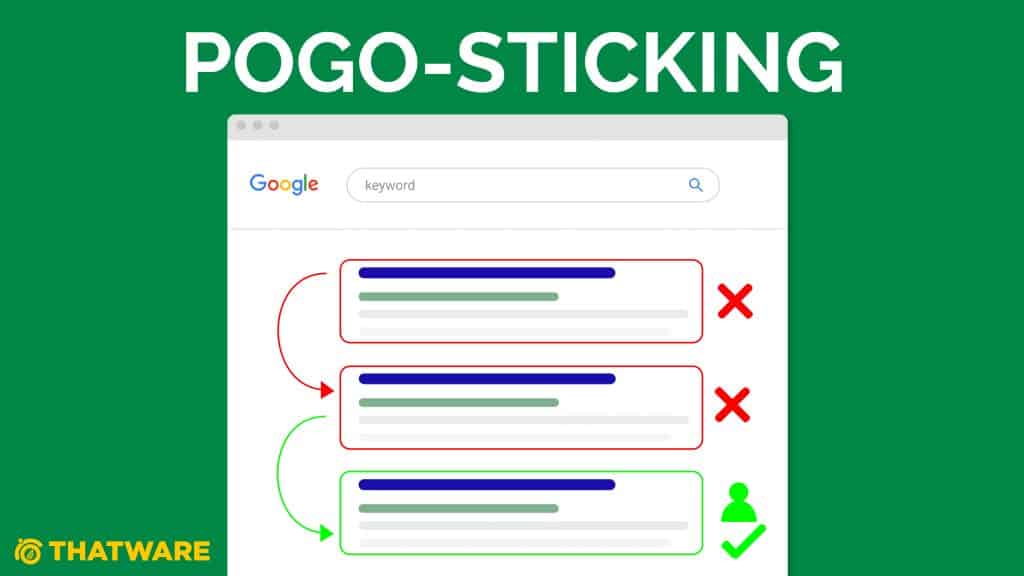SUPERCHARGE YOUR ONLINE VISIBILITY! CONTACT US AND LET’S ACHIEVE EXCELLENCE TOGETHER!
Long have content strategists, and SEO specialists wondered how well-written material performs in search. While Google has not defined what constitutes high-quality SEO content ranks high in search results, research indicates that putting the user first can significantly benefit brand publishers. We’ve heard a lot about the pogo-sticking effect and what it implies for analytics reporting and beyond as someone who works directly with customers to integrate SEO and content production objectives. Allow us to clarify.

The Pogo-Sticking Experiment
Going back and forth from a SERP to an individual search result destination site is called pogo-sticking. In other words, pogo-sticking occurs when a searcher clicks on a link on a SERP. Then they realize it isn’t what they are looking for. and instantly hits the back button. She then selects another result from the results page to meet her informational need. You can closely track this incident in Google Analytics as “bounce rate.”
Pogo-sticking isn’t in the best interests of Google, Bing, the searcher, or the brand publisher because search engines want users to find the material they want on their first try; thus, it’s not in the best interests of Google, Bing, the searcher, or the brand publisher. Material with a high bounce rate may disappear from search results, placing even more pressure on authors to create SEO content that genuinely stays.
How Can I Tell If I Have A Pogo-Sticking Issue And How Do I Fix It?
“Am I developing content focused around what my audience is searching for online?” should be the first question any SEO should ask. This may appear to be a simple question, but it is not. Red Bull, for example, realized that its target demographic did not want to read about the advantages of its goods. Instead, the firm recognized an opportunity to build an extreme sports-focused website. This brand-aligned approach pulled in a sizable following, all of whom have become brand ambassadors and are more likely to promote Red Bull to their friends than any other energy drink. So, get to know your audience and learn about their information and entertainment demands.
“Can I decrease my bounce rate?” should be the second thing each SEO or marketer should ask. Yes, the answer is yes. A high bounce rate suggests that users return to their search results and click on rival material.
- Recognizing what terms drive visitors to your site and examining how those phrases correspond with the material displayed on your landing pages will help you lower the bounce rate. If there is a clear disconnect, change the content.
- Analyzing your copy might help you identify lost chances. You should not regard landing pages as static content types. You should update them regularly to reflect current market developments, new statistics, new internal resources, and other factors.
- Thinking about how user experience affects the success of your brand’s digital presence. If your information is below the fold and consumers have to scroll to locate it, they may give up and return to the search engine landing page for another resource.
Causes Of Pogo Sticking:-
- Title And Description Do Not Reflect The Content – The title and description of your page should match the content of your website, and it should be interesting since it displays itself as a summary of your page.
Otherwise, due to dissatisfaction, the user will visit another website.
- Spammy Content – Spammy content contains crammed keywords. As a result, keyword usage should adhere to the keyword formulas. Otherwise, Google’s algorithms will classify the content as spammy.
- Incorrect Grammar and Spelling Mistakes in the Content — The website’s staff should be error-free with excellent grammar so that users can acquire meaningful content.
How Can You Avoid Pogo Sticking?
SEO experts must develop good SEO methods that include appealing, engaging, and user-friendly landing pages to avoid pogo-sticking and acquire more organic traffic.
Marketers could also consider allowing Google to poll their visitors by incorporating Google’s customer satisfaction questionnaires for website owners. These brief surveys can significantly impact search success if you regularly achieve user happiness.
In addition, thorough preparation of meta titles and descriptions is required since a person clicks on the page on SERP based on the title and meta description.
The user experience is critical in this case. As a result, generate superb SEO-related original and interesting content using grammatically accurate language.
We hope that we can clear up any confusion about Pogo Sticking.
Diversify Your Content Formats to Boost SEO
Incorporating diverse content formats like videos, infographics, and podcasts caters to varied audience preferences and enhances engagement rates. Videos capture attention quickly and offer a dynamic way to convey information, improving user retention and reducing bounce rates.
Infographics present complex data in a visually appealing format, making it easier for users to grasp key concepts at a glance. Podcasts provide an auditory experience, allowing users to consume content conveniently while multitasking or on the go.
By offering content in different formats, you can cater to the diverse needs and preferences of your audience, encouraging them to stay longer on your website. Additionally, diverse content formats increase the likelihood of your content being shared across different platforms, amplifying your online presence and boosting organic traffic.
Incorporating a mix of content formats also signals to search engines that your website provides valuable and comprehensive information, potentially improving your search engine rankings.
Optimizing Page Loading Speed: A Crucial Factor for SEO Success
In the digital realm, where attention spans are fleeting and competition is fierce, every second counts. This rings especially true when it comes to the loading speed of your website’s pages. Understanding the intricacies of page loading speed and its impact on both user experience and SEO performance is essential for any website owner or marketer.
Page loading speed is not merely a technical metric; it is a crucial component of user experience. Research has indicated that users are increasingly intolerant of slow-loading websites, with even a one-second delay leading to higher bounce rates and decreased user satisfaction.
In today’s fast-paced world, where instant gratification is the norm, users expect websites to load swiftly and seamlessly.
Impact on User Experience
Slow-loading pages frustrate users, leading to a poor browsing experience and, ultimately, a negative perception of your brand. Visitors are more likely to abandon a website if it takes too long to load, resulting in lost opportunities for engagement, conversions, and revenue. Moreover, in an era where mobile usage is ubiquitous, ensuring that your website loads quickly on smartphones and tablets is paramount.
Technical Considerations
Improving page loading speed requires a multifaceted approach. Factors such as server response time, image optimization, and the compression of CSS and JavaScript files all play a role in determining how quickly your pages load. By optimizing these technical elements, you can significantly enhance the performance of your website and provide users with a smoother browsing experience.
Mobile Responsiveness
With mobile devices accounting for a significant portion of web traffic, optimizing page loading speed for mobile is no longer optional—it’s a necessity. Mobile users expect websites to load just as quickly on their smartphones as they do on desktop computers. Failure to meet these expectations can result in high bounce rates and diminished organic visibility in mobile search results.
SEO Implications
Page loading speed isn’t just about user experience; it also has tangible implications for search engine optimization (SEO). Search engines like Google prioritize fast-loading websites in their search results, considering page speed as a ranking factor. A slow-loading website may struggle to rank well in search engine results pages (SERPs), resulting in reduced visibility and organic traffic.
Tips for Improvement
Fortunately, there are several strategies you can employ to improve your website’s page loading speed. Optimizing images, leveraging browser caching, and utilizing content delivery networks (CDNs) are just a few examples of techniques that can help reduce loading times and enhance user experience. Therefore, regularly monitoring and analyzing page speed performance using tools like Google PageSpeed Insights can also provide valuable insights into areas for improvement. It will help to prevent your website from being a Pogo stick website.
Mobile Responsiveness for Enhancing User Experience
Key Importance: Mobile responsiveness ensures your website adapts seamlessly to various screen sizes, providing a consistent and user-friendly experience across devices.
User Expectations: With the proliferation of smartphones, users expect websites to load quickly and display correctly on their mobile devices, enhancing accessibility.
SEO Benefits: Google prioritizes mobile-friendly websites in search results, making mobile responsiveness a crucial factor for SEO success and organic visibility.
Internal Linking for Maximizing Engagement & SEO
Strategic Connections: Internal linking connects different pages within your website, guiding users to relevant content and enhancing navigation and user experience.
SEO Advantages: Internal links distribute link equity throughout your site, improving crawlability and helping search engines discover and index your content more effectively.
Enhancing Relevance: Strategic internal linking reinforces the thematic relevance of your website, signaling to search engines the importance and authority of your content.
By prioritizing mobile responsiveness and implementing strategic internal linking, you can effectively improve user experience, enhance SEO performance, and boost organic visibility.
Optimizing for Featured Snippets
Featured snippets, also known as answer boxes or position zero results, are concise summaries of answers to user queries displayed at the top of search engine results pages (SERPs).
These snippets aim to provide users with quick and relevant answers to their questions without requiring them to click through to a specific website.
Benefits for SEO
Optimizing content for featured snippets offers several benefits for search engine optimization (SEO). Firstly, it can significantly increase visibility, as content that appears in featured snippets is prominently displayed above organic search results.
This increased visibility can lead to higher click-through rates and organic traffic. Additionally, appearing in featured snippets can help establish your website as an authoritative source of information in your industry or niche.
Strategies for Optimization
To optimize content for featured snippets, it’s essential to understand the types of queries that typically trigger them. These include questions that begin with “who,” “what,” “when,” “where,” “why,” and “how.” Focus on providing clear and concise answers to these queries within your content. Structuring your content with headings, bullet points, and tables can also enhance its eligibility for featured snippet inclusion.
User Intent Analysis – The Key to Effective Content
The intent of users is the underlying purpose behind a user’s search query. The three main categories of user purpose are informative, navigational, along transactional.
Informational intent involves seeking information or answers to questions, navigational intent involves finding a specific website or resource, and transactional intent involves completing a specific action, such as making a purchase.
Analyzing user intent is crucial for creating content that meets the specific needs and expectations of your target audience.
Therefore, by understanding the intent behind users’ searches, you can tailor your content to provide relevant and valuable information, improving user engagement and satisfaction. Additionally, aligning your content with user intent can help improve its visibility and rankings in search engine results pages.
Research Techniques
To analyze user intent effectively, utilize keyword research tools and analyze search engine results pages (SERPs). Pay attention to the types of content that appear for relevant search queries and consider how you can create content that better meets users’ needs and intent. By understanding the intent behind users’ searches, you can create more targeted and effective content that resonates with your audience.
Optimizing content for featured snippets and understanding user intent are integral strategies for enhancing SEO performance. By crafting concise and informative content that aligns with user queries and intent, websites can improve visibility, drive organic traffic, and establish authority in their respective industries.
Continuous monitoring and iteration further reinforce these efforts, allowing businesses to adapt to evolving trends and user preferences. They can also easily avoid Pogosticking. Embracing these practices improves search engine rankings and enhances user experience, ultimately leading to greater success in the competitive digital landscape.
Pogo Sticking: Understanding Its Impact on SEO and How to Mitigate It
Pogo sticking is a critical user behaviour that can significantly influence your website’s search engine rankings. In SEO, the term refers to a situation where users quickly leave a webpage after clicking on it and return to the search engine results page (SERP) to select another result. This behaviour signals dissatisfaction or a lack of relevance, which search engines interpret as a poor user experience.
In this comprehensive guide, we’ll delve into the concept of pogo sticking, its impact on your website’s SEO performance, and actionable strategies to mitigate it.
What is Pogo Sticking?
Pogo sticking occurs when users interact with search results but find the content of a page unsatisfactory, causing them to “bounce” back to the SERP to explore other options. This differs from a bounce rate, which measures users leaving a site without interacting further. Pogo sticking specifically highlights dissatisfaction and impacts rankings more adversely.
Common Causes of Pogo Sticking
- Irrelevant Content: The content doesn’t match the user’s search intent.
- Slow Page Load Times: Users abandon pages that take too long to load.
- Poor UX Design: Complicated navigation or cluttered interfaces drive users away.
- Deceptive Meta Titles and Descriptions: Misleading snippets result in unmet expectations.
- Overwhelming Ads or Pop-ups: Excessive interruptions frustrate users, prompting them to leave.
Why Does Pogo Sticking Matter in SEO?
Pogo sticking sends a strong signal to search engines about the quality and relevance of your webpage. Here’s why it matters:
- User Experience Indicator: Search engines prioritize pages that meet user expectations. Pogo sticking highlights a failure in this regard.
- Impact on Rankings: Pages with high pogo-sticking rates may see a decline in rankings as search engines favour better-performing pages.
- Conversions and Engagement: If users leave without engaging, your chances of converting them into customers diminish.
Understanding and addressing pogo-sticking is vital for maintaining a competitive edge in search engine rankings and delivering an exceptional user experience.
How to Identify Pogo Sticking on Your Website?
To combat pogo sticking effectively, you need to recognize when it’s happening. Here are key methods to identify it:
- Monitor Dwell Time: Use tools like Google Analytics to track how long users stay on your pages.
- Analyze Bounce Rates: High bounce rates in combination with low dwell times can indicate pogo-sticking.
- Track Exit Pages: Identify pages where users commonly leave your site and evaluate their content quality.
- Heatmap Tools: Tools like Crazy Egg or Hotjar can show where users click, scroll, or leave your pages.
Strategies to Reduce Pogo Sticking
Addressing pogo sticking requires a multi-faceted approach. Here’s how to optimize your website for better user engagement and reduced pogo sticking:
1. Understand Search Intent
Creating content that aligns with what users are looking for is crucial.
- Conduct Keyword Research: Use tools like SEMrush or Ahrefs to understand the intent behind keywords.
- Match Content to Intent: Create content tailored to informational, navigational, or transactional search queries.
2. Craft Compelling Meta Titles and Descriptions
Ensure that your meta tags accurately represent your page content.
- Avoid Clickbait: Don’t mislead users with exaggerated or irrelevant titles.
- Include Keywords: Incorporate target keywords naturally to match user expectations.
3. Enhance Page Load Speed
A slow-loading page is a surefire way to lose users.
- Optimize Images: Compress images to improve load times.
- Enable Caching: Use browser caching to reduce loading delays.
- Invest in a CDN: Content Delivery Networks (CDNs) can help distribute your content faster.
4. Improve User Experience (UX)
A seamless and visually appealing design keeps users engaged.
- Intuitive Navigation: Make it easy for users to find what they’re looking for.
- Responsive Design: Ensure your site is mobile-friendly.
- Minimize Distractions: Limit intrusive ads or pop-ups that disrupt user flow.
5. Create High-Quality Content
Valuable and engaging content is the cornerstone of reducing pogo-sticking.
- Provide In-Depth Information: Answer user queries comprehensively.
- Use Visuals: Incorporate videos, infographics, and images to make content engaging.
- Regular Updates: Keep your content fresh and relevant to maintain its value over time.
6. Encourage Interaction
Engagement tools can keep users on your page longer.
- Add Internal Links: Guide users to other relevant pages on your site.
- Use Interactive Elements: Polls, quizzes, or comment sections encourage participation.
- Offer Clear CTAs: Call-to-action buttons direct users towards the next step.
7. Analyze and Test Regularly
Continuous improvement ensures your site stays optimized.
- A/B Testing: Test different designs, headlines, or layouts to find what works best.
- User Feedback: Collect feedback to understand what users like or dislike.
Real-Life Examples of Pogo Sticking
Example 1: Irrelevant Content
A user searches for “best vegan restaurants in Dubai” but lands on a page listing general restaurants. Dissatisfied, they quickly return to the SERP.
Solution: Create a dedicated page with a comprehensive list of vegan restaurants in Dubai, including reviews and recommendations.
Example 2: Slow Loading Page
A user clicks on a product page during a sale but leaves because it takes too long to load.
Solution: Optimize page load speed by compressing images, enabling caching, and using faster hosting services.
Tools to Help Combat Pogo Sticking
Several tools can assist in diagnosing and resolving pogo-sticking issues:
- Google Analytics: Monitor bounce rates, dwell times, and exit pages.
- Hotjar: Use heatmaps to understand user behaviour on your pages.
- GTmetrix: Analyze and improve page load speeds.
- SEMRush: Identify keywords and optimize content for search intent.
The Role of Content Marketing in Reducing Pogo Sticking
Effective content marketing is pivotal in engaging users and keeping them on your site. Strategies include:
- Creating Evergreen Content: Provide long-term value to your audience.
- Using Storytelling: Capture attention with relatable and compelling narratives.
- Publishing Regularly: Keep your audience coming back for fresh insights.
Conclusion
Pogo sticking is more than just a user behaviour; it’s a vital indicator of how well your website meets user expectations. By understanding its causes and implementing strategies to address them, you can reduce pogo sticking, improve your SEO performance, and deliver a better user experience.
If you’re looking for expert assistance in optimizing your website and addressing pogo-sticking issues, ThatWare offers cutting-edge solutions tailored to enhance user engagement and boost your search rankings. Partner with us to create a seamless digital experience that keeps users coming back for more!

Thatware | Founder & CEO
Tuhin is recognized across the globe for his vision to revolutionize digital transformation industry with the help of cutting-edge technology. He won bronze for India at the Stevie Awards USA as well as winning the India Business Awards, India Technology Award, Top 100 influential tech leaders from Analytics Insights, Clutch Global Front runner in digital marketing, founder of the fastest growing company in Asia by The CEO Magazine and is a TEDx speaker and BrightonSEO speaker.


